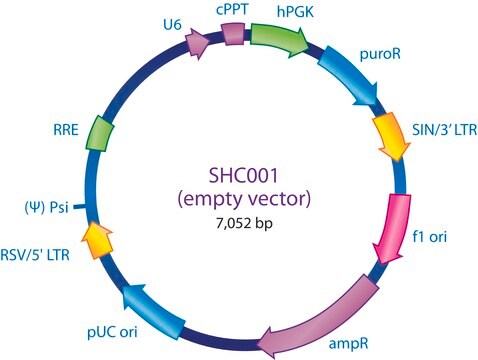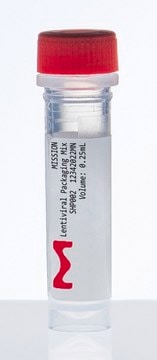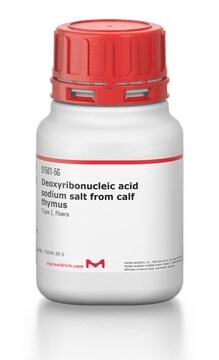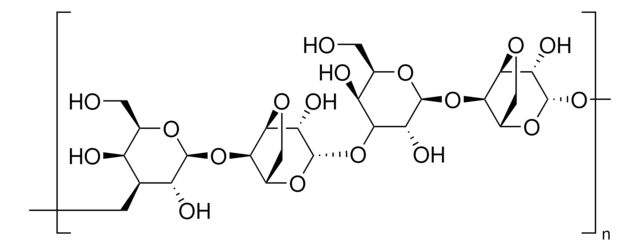D9893
pBR322 Plasmid DNA from E. coli RRI
lyophilized powder
Sign Into View Organizational & Contract Pricing
All Photos(1)
About This Item
CAS Number:
EC Number:
MDL number:
UNSPSC Code:
12352200
eCl@ss:
32160414
NACRES:
NA.52
Recommended Products
biological source
Escherichia coli
Quality Level
grade
for molecular biology
form
lyophilized powder
mol wt
2.9 MDa
4363 bp
storage temp.
2-8°C
Looking for similar products? Visit Product Comparison Guide
General description
Plasmid pBR322 was one of the first multipurpose cloning vectors constructed for use in E. coli. This plasmid is derived from the ColE1-type plasmid pMB1 and shares the same type of replication mechanism and controls as ColE1 and relatives. Plasmid pBR322 confers resistance to ampicillin and tetracycline. The plasmid sequence has been published.
The plasmid has unique restriction sites within the gene for ampicillin resistance (Pst I, Pvu I, and Sca I), within the gene for tetracycline resistance (BamH I, BspM I, EcoR V, Nhe I, Nru I, Sal I, Sph I, and Xma III), and elsewhere (Aat II, Ava I, Bal I, Bsm I, BspM II, Cla I, EcoR I, Hind III, Nde I, Pvu II, Ssp I, Sty I, and Tth111 I).
The plasmid has unique restriction sites within the gene for ampicillin resistance (Pst I, Pvu I, and Sca I), within the gene for tetracycline resistance (BamH I, BspM I, EcoR V, Nhe I, Nru I, Sal I, Sph I, and Xma III), and elsewhere (Aat II, Ava I, Bal I, Bsm I, BspM II, Cla I, EcoR I, Hind III, Nde I, Pvu II, Ssp I, Sty I, and Tth111 I).
Specificity
Unique Sites: Within the gene for ampicillin resistance: Pst I, Pvu I, Sca I; Within the gene for tetracycline resistance: BamH I, BspM I, EcoR V, Nhe I, Nru I, Sal I, Sph I, Xma III; other unique sites: Aat II, Ava I, Bal I, Bsm I, BspM II, Cla I, EcoR I, Hind III, Nde I, Pvu II, Ssp I, Sty I, Tth111 I.
Application
Plasmid pBR322 was one of the first multipurpose cloning vectors constructed for use in Escherichia coli. This plasmid and derivatives have been used for a number of purposes including cloning, selection and expression of recombinant molecules, construction of shuttle vectors and vectors for nucleotide sequencing, studies of elements involved in gene expression, as plasmid DNA standards, and as a model system for studies on prokaryotic plasmid replication.
pBR322 Plasmid DNA from E. coli RRI has been used as a low molecular weight DNA to test the enzymatic activity of partially purified component from Perna viridis (Linn.) It has also been used for investigating its effect on the calcium carbonate particle morphology by scanning electron microscopy studies
Biochem/physiol Actions
This plasmid is derived from the ColE1-type plasmid pMB1 and shares the same type of replication mechanism and controls as ColE1 and relatives.
Components
DNA is provided as a powder, lyophilized from a solution of 1 mM Tris-HCl (pH 7.5) with 1mM NaCl and 1mM EDTA.
Other Notes
Accession number: J01749
Accession number: J01749
Related product
Product No.
Description
Pricing
Storage Class
11 - Combustible Solids
wgk_germany
WGK 3
flash_point_f
Not applicable
flash_point_c
Not applicable
ppe
Eyeshields, Gloves, type N95 (US)
Certificates of Analysis (COA)
Search for Certificates of Analysis (COA) by entering the products Lot/Batch Number. Lot and Batch Numbers can be found on a product’s label following the words ‘Lot’ or ‘Batch’.
Already Own This Product?
Find documentation for the products that you have recently purchased in the Document Library.
Customers Also Viewed
Changes in tumorigenesis- and angiogenesis-related gene transcript abundance profiles in ovarian cancer detected by tailored high density cDNA arrays.
Martoglio, A.-M., et al.
Cancer Biochemistry Biophysics, 6, 750-750 (2000)
S Iuliano et al.
Journal of chromatography. A, 972(1), 77-86 (2002-10-25)
A HPLC technique has been developed, based on hydrophobic-interaction Chromatography with a non-porous packing (TSKgel Butyl-NPR, Tosoh Biosep LLC), that allows separation of the open circular (nicked) and supercoiled forms of five DNA plasmids, ranging in size from 4 to
S Leah Etheridge et al.
PLoS genetics, 4(11), e1000259-e1000259 (2008-11-15)
Dishevelled (Dvl) proteins are important signaling components of both the canonical beta-catenin/Wnt pathway, which controls cell proliferation and patterning, and the planar cell polarity (PCP) pathway, which coordinates cell polarity within a sheet of cells and also directs convergent extension
Our team of scientists has experience in all areas of research including Life Science, Material Science, Chemical Synthesis, Chromatography, Analytical and many others.
Contact Technical Service










